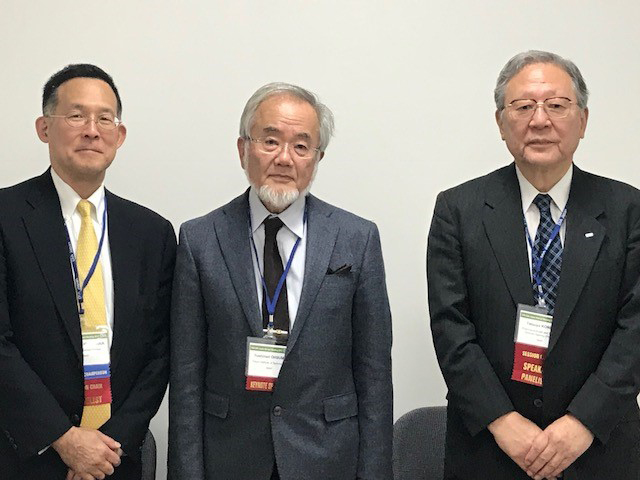Around The Globe
A Nobel Scientist and a Top Regulator Talk Translational Science
Shared Visions at 14th DIA Japan Annual Meeting
Junko Sato, PMDA
Program Advisor, DIA Japan Annual Meeting
Junichi Nishino
Global Forum Japan Regional Editor
or all of its distinguished track record in scientific research and world-class discoveries, Japan faces significant challenges in consistently translating those discoveries into therapeutic applications for patients.
In Europe and America, the development of venture capitalism and the formation and smooth operation of consortia provide the groundwork for robust and sustained cooperation between academia and industry in cutting-edge medical research. This situation is somewhat different in Japan: It can be considerably more difficult to attract capital for basic research, available funding tends to be lower than in Europe and America, and most funding capital is in the form of short-term, two- to three-year grants from public agencies. These factors make it difficult to cultivate venture development in Japan, and contribute to the complications of sustaining long-term basic research at single laboratories. In January 2018, the Japan Council for Science, Technology and Innovation announced that, in response, the Abe government increased its 2018 investment in science and technology to 3.84 trillion yen ($35B US), toward its goal of investing 1% of Japan’s gross domestic product by 2020 (up from 0.65% in 2015).
This theme emerged early at the 14th DIA Japan Annual Meeting 2017, which was opened under the leadership of Session Chair Dr. Tatsuya Kondo, Chief Executive of the Pharmaceuticals and Medical Devices Agency (PMDA) of Japan. 2017 Nobel Laureate Professor Yoshinori Ohsumi from the Institute of Innovative Research at the Tokyo Institute of Technology delivered the first keynote address, Looking Back on 40 Years of Yeast Research. But before this address, Dr. Ohsumi and Dr. Kondo shared their thoughts about how best to promote Japanese science.

Dr. Yasuhiro Fujiwara, Program Chair and Director-General, Strategic Planning Bureau, National Cancer Center; Prof. Yoshinori Ohsumi, Tokyo Institute of Technology, 2016 Nobel Laureate in Physiology or Medicine; and Dr. Tatsuya Kondo, Chief Executive, PMDA.
Professor Ohsumi described current difficulties in sustaining basic research in Japan, emphasizing that better cooperation between basic research and industry should be discussed, and that adequate support of basic research is an essential precondition for Japanese science to flourish.
Dr. Kondo agreed fully with Professor Ohsumi’s observations. He further noted, from his own clinical experience as a physician, that new structures and strategies are required to translate Japan’s superb basic research into real-world diagnostic and therapeutic advances for patients. Dr. Kondo took this opportunity to introduce a number of PMDA initiatives, such as scientific boards and the Pharmaceutical Affairs Consultation on Research and Development Strategy, to encourage use of the latest science and technology in the development and appropriate use of new drugs and medical devices.
It was a most telling moment: While one discussant works in basic research and the other in regulatory science, they held in common their profound commitment to pursuing studies in areas of personal interest instead of following the lead of other scientists. Each, from his own perspective, pledged to continue pursuing their current research to contribute to their shared goal: improved patient welfare in Japan.

